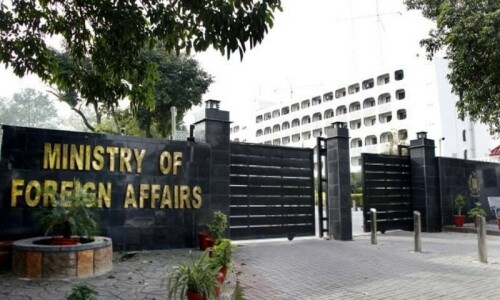THE recent success of the Port Qasim dock workers’ union in claiming due rights after months of struggle is worthy of our attention for three reasons. Foremost is the fact that this is the first time workers took an open stand against rights violations committed by a Chinese company working for a CPEC project. Secondly, the way the dock workers’ union garnered solidarity of a larger representation of trade unions and civil society reflected positively on the unionised labour in Karachi ports and the trade union movement no matter how weak it stands in the current neoliberal environment. Thirdly, it provides an opportunity to take stock of labour legislation and international standards compliance in our ports.
It is not the first time that labour violations in a Chinese-led CPEC project have come to light. More than 100 on-site deaths and injuries were reported in the construction phase of the Lahore Orange Line Metro Bus project due to lack of health and safety standards. A recent 2018 investigation of labour conditions in the construction of the M-4 Motorway, another project under CPEC, revealed contractual labour on low wages and precarious work conditions.
As infrastructure development under CPEC projects gains momentum, it is critical that, besides economic benefits, social cost should be monitored and efforts made to mitigate adverse implications. Both China and Pakistan have a reputation for poor treatment of their workers. Both got the same ranking (five at the bottom) in the ITUC Global Rights Index 2018. According to the index, countries with the rating of five are the worst countries in the world to work in. Though legislation spells out certain rights, workers have effectively no access to these rights and are exposed to unfair labour practices. Despite all odds, workers in China, like in Pakistan, are collectively making their voices heard. About 600 strikes by workers were reported in China in 2017 and recent estimates are even higher.
Dock workers around the world face numerous challenges with globalisation of trade, economic restructuring and adoption of new cargo-handling methods. Historically, dock workers have struggled against the adverse consequences of their work’s temporary nature. After the great London dock strike of 1889 against the insecurity of jobs, voluntary registration schemes for decasualisation through contribution by employers were initiated in the UK. The scheme, made statutory after the 1945 strike under the Dock Workers (Regulation of Employment) Act, 1946, and administered through the National Dock Labour Board, was termed ‘anachronistic’ by neoliberals and abolished during the Thatcher era amidst protests by trade unions.
Earlier gains made by dock workers are being eroded.
In Pakistan, the Karachi Dock Labour Board was formed under the Dock Workers (Regulation of Employment Act), 1974. There are about 2,800 workers registered with the board. In 2006, the World Bank advised the government to abolish the board, register the workers but not treat them as permanent employees and shift the cost of labour protection to the stevedoring companies.
The unions at the port are fighting to keep the scheme going. The KPT exempted the South Asia Pakistan Terminals (Hutchinson Ports Pakistan) from the jurisdiction of the board under an agreement with the cargo handling company. Dock workers fought for years till in March 2018 the conflict over labour welfare cess was resolved. In April, the dock workers’ union successfully negotiated a two-year collective agreement with the Pakistan International Container Terminal that delivered a 20 per cent wage increase, payment of arrears and regularisation of jobs.
The story of Port Qasim is grim; the authorities consider it outside the jurisdiction of the Karachi Dock Labour Board while the workers demand the 1974 law be implemented.
Pakistan has ratified two old conventions (C 27 & C 32) related to dock workers. Since both have become outdated, the ILO has advised Pakistan to ratify Dock Work Convention No.137 and the Occupational Safety and Health (Dock Work) Convention No.152. The first deals with new methods of work in docks and aims to afford protection to dock workers. It calls the ratifying state to formulate a national policy to provide for registration and permanent employment and ensure health and safety, vocational training and workers’ collective agency.
As the gains made by dock workers in earlier times are being eroded with containerisation, privatisation and port reforms, it is incumbent on the government to formulate and implement a policy that safeguards their rights, inclusive of the right to unionise and collective bargaining, and ratify the relevant ILO conventions. Despite reduction of the workforce at ports due to technological changes, registration of dock workers, their permanent employment and stability of income are still essential for efficient working of the ports.
The writer is a researcher in the development sector.
Published in Dawn, January 24th, 2019











































